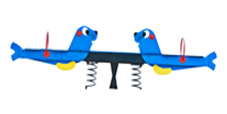
The Teeter Totter
Marriage is like a teeter-totter: at any given time one partner may be up while the other is down and it takes significant effort to create a perfect balance…

Most of us have some fond memories from our childhood of playing in a park filled with all the playground equipment imaginable. Romping from one exciting apparatus to the next, we couldn’t get enough of the fun. Aside from the obvious enjoyment, it also provided us with exercise, developed our co-ordination and taught us to interact with other children in a social setting. The qualities of sharing and patience were enhanced each time we had to wait for a longed-for turn on the slide, swing or anything else.
 One toy that was not such a favorite of mine was the teeter-totter (also known as a seesaw). It is a very simple design, with a“long, narrow board pivoted in the middle so that, as one end goes up, the other goes down. A person sits on each end, and they take turns pushing their feet against the ground to lift their side into the air.”(Wikipedia). In order to balance properly, the children would have to be similar weight or at least make a greater effort to make it an equalized ride. Its appeal was diminished even further since the child facing me inevitably jumped off the teeter-totter first and I would hit the ground without warning.
One toy that was not such a favorite of mine was the teeter-totter (also known as a seesaw). It is a very simple design, with a“long, narrow board pivoted in the middle so that, as one end goes up, the other goes down. A person sits on each end, and they take turns pushing their feet against the ground to lift their side into the air.”(Wikipedia). In order to balance properly, the children would have to be similar weight or at least make a greater effort to make it an equalized ride. Its appeal was diminished even further since the child facing me inevitably jumped off the teeter-totter first and I would hit the ground without warning.
In some ways, the teeter-totter is a lot like marriage. In order for it to function successfully, it requires a lot of team work. Whether a couple already maintains a home overflowing with Shalom Bayit (peace) or is constantly struggling to reach that goal, we all yearn to sustain the equilibrium. As with the teeter-totter, at any given time one person may be up while the other is down and it takes significant effort to create a perfect balance. Even with increased emuna and following the counsel of our spiritual advisors (recommended reading: Women’s Wisdom and Garden of Peace), as humans, our moods can cause us great anxiety. We are taught that this is only our yetzer hara (evil inclination) trying to push us to despair and wreak havoc in our home, therefore it is our challenge to overcome the negative temptations by strengthening ourselves in holiness. Where one creates a receptacle for HaShem’s Light, the yetzer hara cannot enter.
If a child had the maturity to understand the result of an imprudent action, he would probably not jump off the seesaw leaving his partner to crash to the ground. Similarly, if husbands and wives gave genuine consideration to their deeds with regard to the effect it will have on their other half, they would think twice before they speak or act unfittingly.
In order to get the most out of the ride, kids use their legs to propel themselves upward, which in turn causes their mate to descend. As an analogy for spiritual pursuits, the preference is always in the ascent, so as soon as one finds himself at the bottom, he again pushes to boost himself into the air. No one wants to remain in the low position for long, so it is resolved repeatedly, both cheerfully and with passion; down and up, down and up. Success can be attributed to the momentum built up by hard work and dedication, both on the home front and in the playing field.
Try to visualize a teeter-totter with a husband and wife sitting opposite one another as a portrayal of their relationship. Facing each another, they are compelled to look into the other’s eyes as they attempt to gain insight into their spouse’s inner feelings. Without some knowledge of the deepest portals of their souls, their relationship will never get off the ground. Since they are two halves of the same whole, any attempt to understand one’s counterpart must be preceded by valuing and understanding oneself. A healthy union is like a mirror, reflecting each other’s Neshamas (souls), growing together to build a sanctuary, a dwelling place for HaShem’s blessings. When these two opposing players repel each other rather than attract, it makes for a bad ride, resulting in the necessity to do some serious rectification.
Just as the teeter-totter is made of one solid plank with the axis in the middle, man and wife are but one unit, hinged on a common goal which is ultimately the focal point of both their lives and that of their offspring. That central, connecting point is the root which, with G-d’s Help, develops into a "bayit ne'eman b'Yisrael," a home faithful to the traditions of Israel. If the union is nurtured properly with a synchronized game-plan, it will transcend material concerns in exchange for a sublime existence of submission to HaShem’s Will.
These days, it is all too common that one partner decides to get off the ride and try something else, but with a little persistence and a lot of emuna, even the most difficult experience can be turned around for the good. As Rebbe Nachman of Breslev teaches "You are never given an obstacle you cannot overcome" (Likutey Moharan II, 46).
Last but not least, don’t forget to give thanks for the privilege of utilizing the teeter-totter and pray that HaShem will soon grant turns to those still waiting in line!







Tell us what you think!
Thank you for your comment!
It will be published after approval by the Editor.